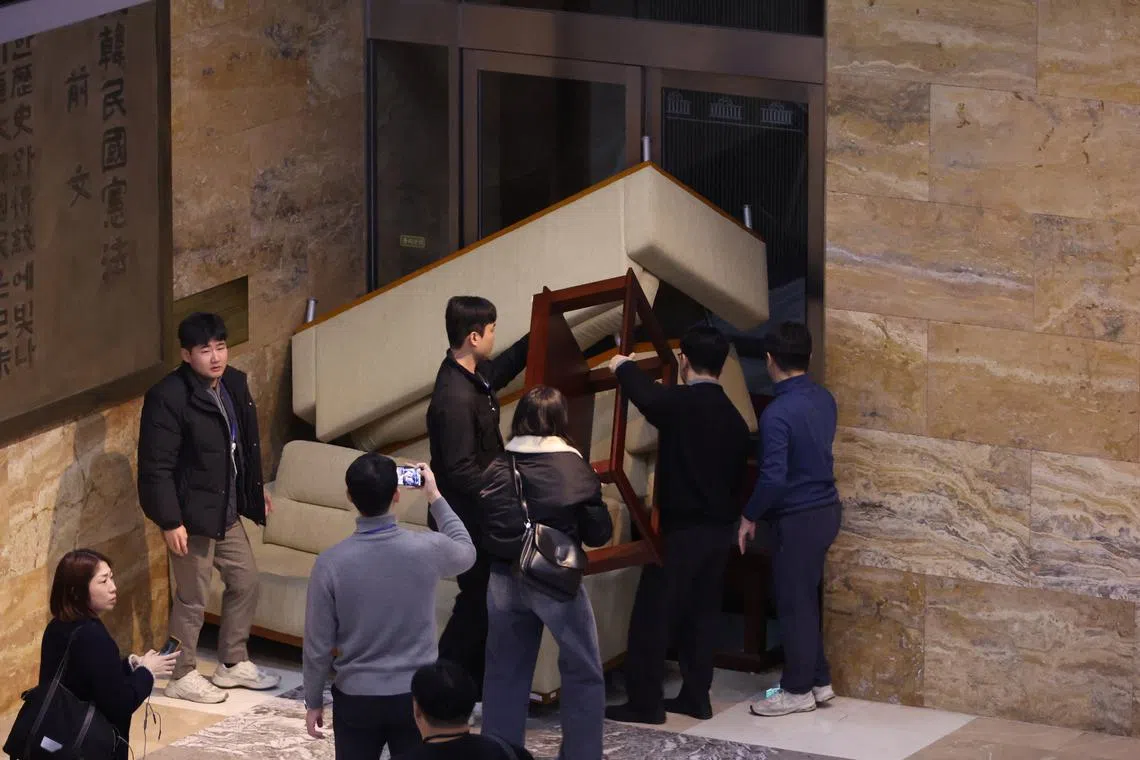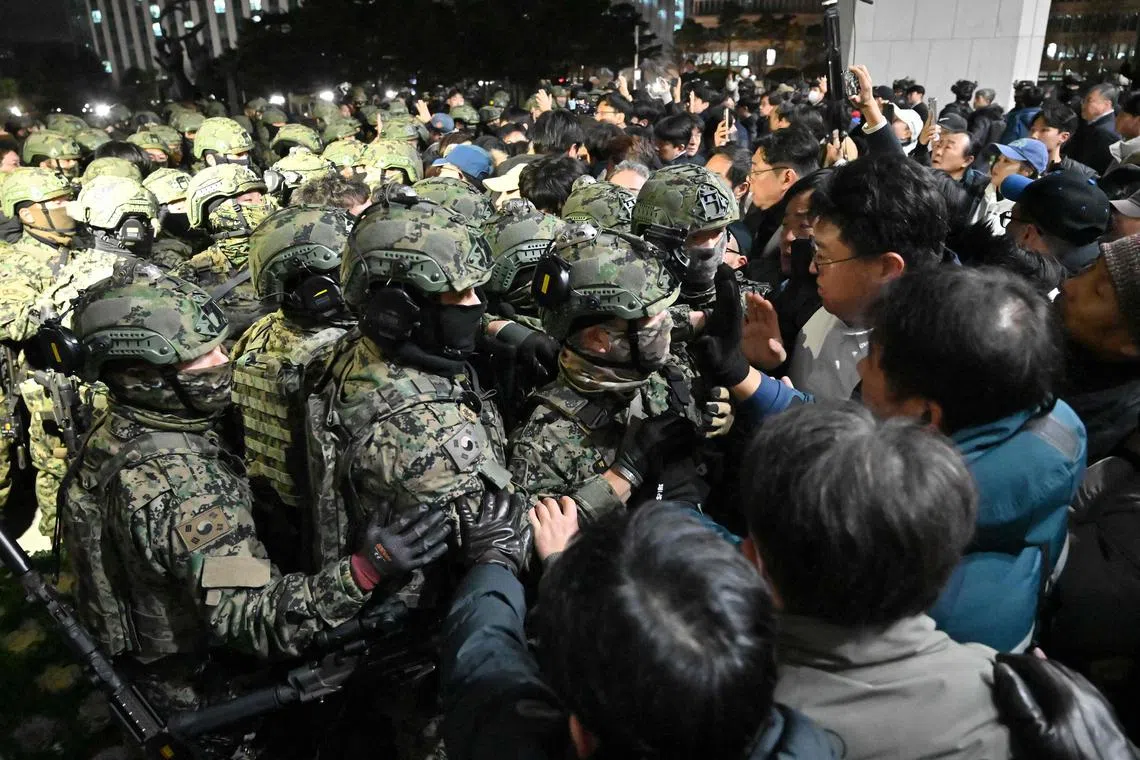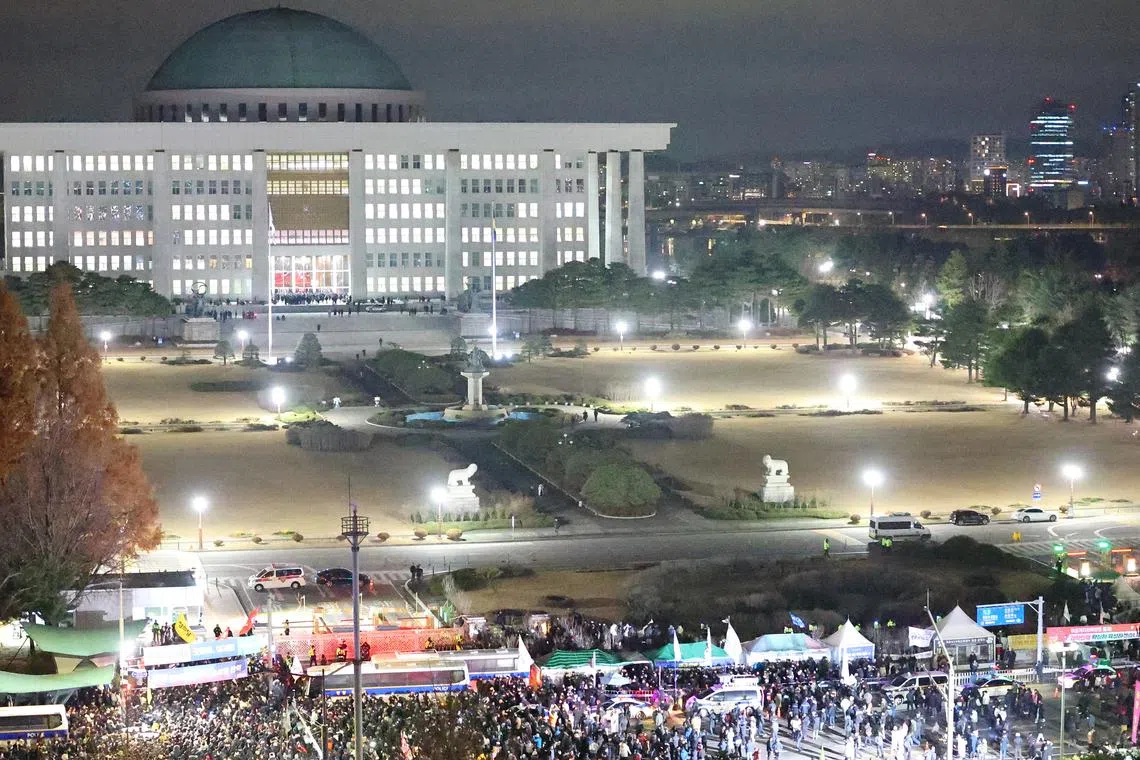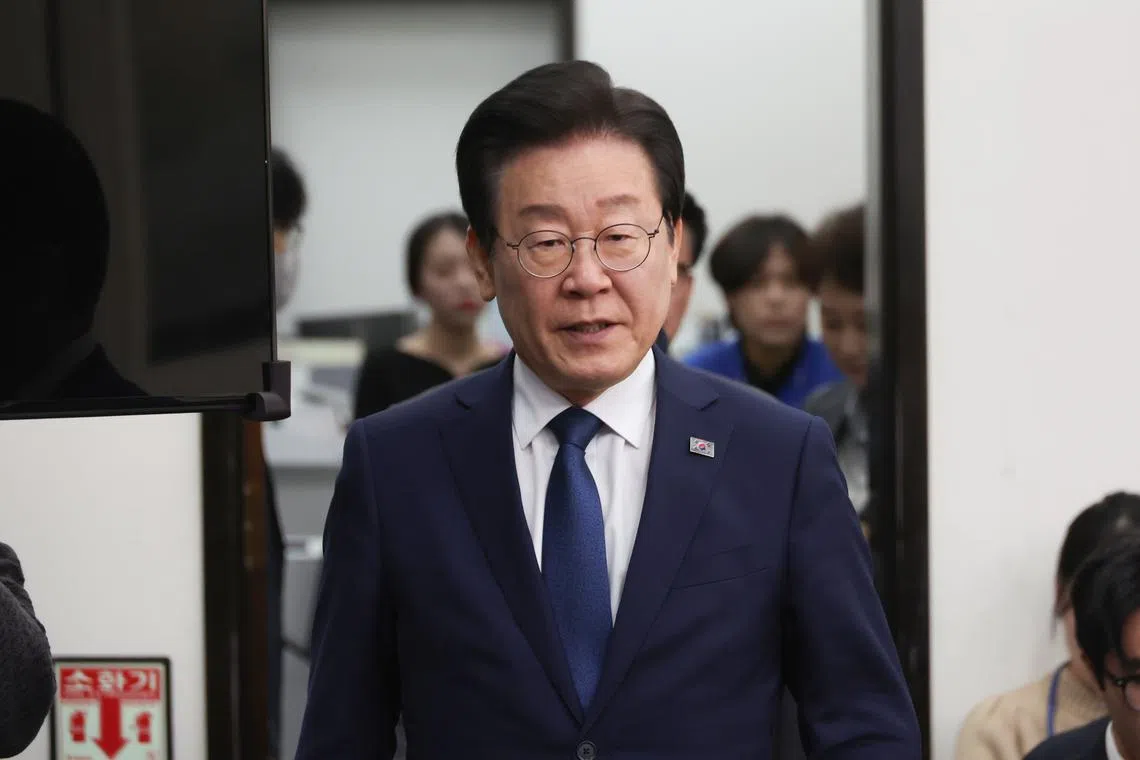South Korea President Yoon declares martial law, but Parliament votes to lift declaration
Sign up now: Get insights on Asia's fast-moving developments
SEOUL – South Korean President Yoon Suk Yeol on Dec 3 declared emergency martial law in an unannounced late night address broadcast live on YTN television, which the opposition-led Parliament voted hours later to revoke.
It was the first time since 1980 that martial law was declared in South Korea.
Mr Yoon claimed he would eradicate “shameless pro-North Korean anti-state forces”, but did not cite any specific threat from nuclear-armed North Korea, instead focusing on his domestic political opponents.
All 190 lawmakers present voted in favour of the motion to revoke the declaration made by Mr Yoon, after Speaker Woo Won-shik convened an emergency plenary session.
According to Korean law, the president is required to lift the declaration if the National Assembly requests it after a majority vote.
Mr Yoon’s martial law declaration sent shock waves through the country, which had a series of authoritarian leaders early in its history but has been considered democratic since the 1980s.
Hundreds of people gathered at the Parliament building to protest against the imposition of martial law, according to live footage.
Live television footage showed troops attempting to enter the assembly building, apparently tasked with imposing martial law, and parliamentary aides trying to push them back by spraying fire extinguishers.
In a Facebook post on Dec 3, the Singapore Embassy in Seoul said it was closely monitoring the situation, urging all Singaporeans in South Korea to stay calm and monitor the news.
“So far, it does not seem to be related to any military incursions,” it said, adding that it will provide more details once the embassy has further updates.
Singaporeans in South Korea are recommended to register online with the Ministry of Foreign Affairs if they have not done so.
According to South Korea’s Constitution and the Martial Law Act, emergency martial law can be declared during wartime, in cases of a major national emergency akin to war or when public order is severely disrupted, rendering administrative and judicial functions significantly impaired.
Emergency martial law grants the military extensive powers to maintain public order. It can temporarily take over administrative and judicial authority and impose restrictions on civil liberties, such as freedom of assembly and the press.
Military personnel may be deployed to manage civil unrest and enforce curfews or other movement restrictions.
“I can’t believe I’m seeing a martial law declaration in my lifetime,” The Korean Herald reported a 30-year-old citizen named Bae as saying, echoing the sentiments of many.

Staff from South Korea’s main opposition Democratic Party setting up a barricade to block soldiers at the National Assembly after South Korean President Yoon Suk Yeol declared martial law.
PHOTO: REUTERS
Many citizens voiced shock and disbelief, with comments such as, “I never thought I’d live to see something like this happen in South Korea”, the Korean Herald reported, adding that the pervasive lack of clarity from government officials is further fuelling speculation and anxiety.
Yonhap news agency cited the military as saying activities by Parliament and political parties would be banned and that media and publishers would be under the control of the martial law command.
The Korean won was down sharply against the US dollar, its weakest level in more than two years, after the announcement. A central bank official said it was preparing measures to stabilise the market if needed.
Finance Minister Choi Sang-mok has convened an emergency meeting among top economic officials, his spokesman said in a text message.
“We will mobilise all possible financial and foreign exchange market stabilisation measures, including unlimited liquidity injections,” he said in the meeting in Seoul.

Soldiers trying to enter the National Assembly building in Seoul on Dec 4 after South Korean President Yoon Suk Yeol declared martial law.
PHOTO: AFP
The Korea Herald reported that Defence Minister Kim Yong-hyun had called for a meeting of key commanders across the country as Mr Yoon made the announcement. Mr Kim ordered all forces to be on high alert.
Mr Yoon’s predecessor, Mr Moon Jae-in of the Democratic Party, said the country’s democracy was in crisis.
“I hope that the National Assembly will act quickly to protect our democracy from crumbling,” he wrote in a post on X. “I ask the people to join forces to protect and save democracy and to help the National Assembly function normally.”
The White House in the US said it was closely monitoring the situation.
“The administration is in contact with the ROK government and is monitoring the situation closely,” a spokesman for the US National Security Council said, using the official abbreviation for the Republic of Korea.
About 28,500 US troops are stationed in South Korea to guard against the North.
A spokesman for the US military command did not answer repeated phone calls.
The Japanese Prime Minister’s Office could not immediately be reached for a comment outside business hours.

Police officers blocking protesters outside the National Assembly in Seoul early on Dec 4.
PHOTO: REUTERS
Mr Yoon said he had no choice but to resort to such a measure to safeguard free and constitutional order, saying opposition parties had taken hostage of the parliamentary process to throw the country into a crisis.
“I declare martial law to protect the free Republic of Korea from the threat of North Korean communist forces, to eradicate the despicable pro-North Korean anti-state forces that are plundering the freedom and happiness of our people and to protect the free constitutional order,” Mr Yoon said.
He did not say in the address what specific measures would be taken.
“Tanks, armoured personnel carriers and soldiers with guns and knives will rule the country,” Mr Lee Jae-myung, leader of the opposition Democratic Party, which has the majority in Parliament, said in a live stream online.
“The economy of the Republic of Korea will collapse irretrievably. My fellow citizens, please come to the National Assembly.”

Democratic Party leader Lee Jae-myung at the National Assembly in Seoul on Nov 25.
PHOTO: EPA-EFE
Mr Yoon cited a motion by the Democratic Party this week to impeach some of the country’s top prosecutors and its rejection of the government’s budget proposal.
“Our Parliament has become a den for criminals. It has paralysed the administrative and legal systems by ramming through (opposition-driven) legislations and is attempting to overthrow our democratic system,” he said.
South Korean ministers on Dec 2 protested against the Democratic Party’s move last week to slash more than four trillion won (S$3.76 billion) from the government’s budget proposal. Mr Yoon said that action undermines the essential functioning of government administration.
South Korea’s opposition parties held a rally on Nov 30 calling for Mr Yoon to accept a special prosecutor investigation on allegations of fraud against First Lady Kim Keon Hee, the latest such protests by the party and civic groups in recent weeks against the President.
In October, North Korean propaganda leaflets apparently carried by balloons were found scattered on the streets of Seoul,


